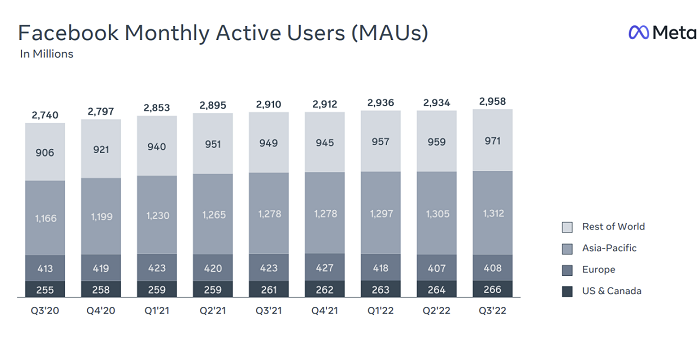SOCIAL
Meta Reports Increasing Costs, Lower Ad Revenue in Q3 Performance Update

Mark Zuckerberg’s commitment to his metaverse vision is about to face its biggest test, with Meta’s Q3 results showing rising costs, reduced ad income, and slower growth in key markets.
First off, on usage – Facebook is now up to 1.98 billion daily active users, an increase of 16 million on its last report.
But as you can see, the hard sell for Facebook here is that all of that growth is coming from the Asia-Pacific and ‘rest of the World’ markets, which are not as lucrative for the company as the US and Europe.

Facebook has seen solid growth in India and Indonesia, as connectivity and accessibility increases in these regions, but the overall usage counts here don’t contribute as much to the company’s bottom line. They will, hopefully, as these markets mature, and Facebook continues to grow its presence. But as you can see, DAU growth in the US and Europe is dead, which is a concerning sign for the app.
Facebook’s monthly active user counts reflect a similar story, with almost all of the growth coming outside of its top revenue markets.

But then again, Facebook usage is holding firm, people are still logging into the app every day, with the total user count still pushing 3 billion. I would question whether those who are logging in are spending as much time as they used to in the app (something Meta doesn’t report), but the overall figures do underline the significant role that Meta’s tools still play in our broader interactive landscape, as do its Family Active People stats (i.e. users of FB, WhatsApp, IG and Messenger).

Meta’s apps are still hugely popular. But even so, there are some concerning signs.
Those concerns are further exacerbated when examining Meta’s revenue numbers. Meta brought in $27.71 billion for the quarter, which is still a massive result, but it represents a decrease of 4% year-over-year.

That reduced revenue performance is partly due to the impacts of data privacy shifts, partly due to the broader economic downturn – while Meta also notes that:
“Had foreign exchange rates remained constant with the third quarter of 2021, revenue would have been $1.79 billion higher”
In other words, there are various factors at play, it’s not one thing that’s hurting Meta’s revenue numbers. But cumulatively, they are having a big impact, which is not good when Meta’s also continuing to invest in its expensive metaverse vision, which has seen its costs and expenses rise by 19% YoY to $22.05 billion.
What’s even worse here is that Reality Labs, its VR department, and its biggest cost center, is also bringing in less revenue over time, as rising VR headset prices, and reduced interest in the metaverse, have seen it declining in sales and revenue intake.

As you can see here, after peaking in Q4 last year, likely due to people getting Quest headsets for Christmas, Reality Labs revenue has declined significantly, while operating losses for the division continue to ramp up.
And Meta says that’s only going to get worse in the short-term:
“We do anticipate that Reality Labs operating losses in 2023 will grow significantly year-over-year. Beyond 2023, we expect to pace Reality Labs investments such that we can achieve our goal of growing overall company operating income in the long run.”
And this does not look great:

It seems the metaverse push is going to cost a lot more in development before we reach the next stage.
This is arguably the most challenging period in Meta’s history, and indeed, in Zuckerberg’s professional career. The company has lost two-thirds of its value since September last year (and that’s before this earnings result), amid rising skepticism about its metaverse vision, ongoing questions about the negative impacts of its apps, and increasing challenges to its ad business.
On the metaverse, as noted, the company continues to sink cash into its future-looking strategy, which, again, still looks like it’s going to cost a lot more before it’s even close to being a workable, functional, viable alternative for digital connectivity and engagement. Zuck’s view is that, one day, we’ll all be interacting in VR/AR powered spaces, which will enhance the feeling of connection well beyond what current social media apps are capable of doing. And that may be true, but it’ll require widespread take-up of increasingly expensive hardware, and really, a killer app or two that will make its VR and/or AR devices a true must-have
Meta has said that it will take years, perhaps a decade, before we reach the next stage – but can Meta and its investors stomach ten years of pain for the possibility of what could come next?
Which leads to the ad problem. Meta has already said that Apple’s ATT data privacy prompts will cost it around $10 billion this year, and it continues to point to ‘headwinds’ in the ad industry which are impeding the performance of its core ad business. Combine a lack of trust in the company with more consumer choice, then add in a global economic downturn, and the result is that Meta’s ad businesses is not as solid as it once was. It’s still good – the vast majority of Meta’s $27b in revenue this quarter came from ads – but the company really needs to keep growing its ad business in order to keep funding its future projects, which, increasingly, looks to be an impossible balance.
You can also add to this Apple’s latest stab at the company – a 30% tax on boosted posts in social apps announced just this week.
So what does Meta do? It’s too late to go back now, it’s already sunk billions into the metaverse and what it sees as the next phase for the company.
It could scale back that investment, as suggested by Brad Gerstner of Altimeter Capital in a recent open letter, in which Gerstner, as a representative of around 2 million Meta shares, said that:
“We think Meta should cap its metaverse investments to no more than $5B per year with more discrete targets and measures of success, as opposed to today’s much more ambitious and open-ended strategy.”
For context, Meta spent double that on its metaverse projects last year, and will clearly best that again in 2022.
Maybe that would be a way to rationalize investment, and keep its projects on track – but presumably, that would also extend the timeline for its metaverse development. And time is something that Meta might not have.
Because Meta’s apps, while still hugely popular, and still, as noted, seeing overall growth in overall users, are also themselves experiencing a downturn in key areas.
The key consideration here is younger audiences, which Meta has conceded are not using its apps like they once were.

Trends in younger demographics logically ripple through over time, which means that Meta, while it is still a key utility in many respects, is slowly losing ground to other platforms.
It’s not happening rapidly, it’s a steady decline, and it largely relates to time spent in app, as opposed to logging on to check the latest updates then logging off and spending more time elsewhere (which, I would argue, is why Meta’s overall user counts remain high). But it is clearly happening, and while Meta would love to put more time and effort into fixing Instagram and Facebook, and getting its core business back on track, it might not be able to do that, as its replication of every trending app that comes along seems to suggest.
And then there are the concerns around the harm caused by Instagram, how Facebook continues to facilitate the spread of misinformation, how Meta’s plans to encrypt all messages will protect criminals from detection.
When you look at the full scope of Meta’s business, really, it needs to start fresh with the metaverse, and it needs the metaverse to become a thing. Otherwise, it is indeed on a slow and steady descent back to earth.
Again, this is not happening quickly, I’m not saying that Facebook is dead or that Meta will be gone anytime soon, because it absolutely won’t. But Zuck and Co. are logically navigating towards a new future for the company for good reason. And now it’s a race to see whether it can get there, without spending too much, and pissing off too many shareholders, in the process.
All that said, I wouldn’t be counting Meta out too quickly either. Zuckerberg is very likely right, digital interaction in wholly immersive spaces, via avatars, digital goods and more – all of this seems very logical, especially when you look at how youngsters engage in gaming worlds like Fortnite and Roblox. Those are the users Zuck is planning for, not the vocal critics of what the metaverse looks like right now.
And if he gets the timing right, Meta could still be the critical connector in the next phase.
But right now, Zuck and Co. will be feeling the heat, more than ever before.
SOCIAL
Snapchat Explores New Messaging Retention Feature: A Game-Changer or Risky Move?

In a recent announcement, Snapchat revealed a groundbreaking update that challenges its traditional design ethos. The platform is experimenting with an option that allows users to defy the 24-hour auto-delete rule, a feature synonymous with Snapchat’s ephemeral messaging model.
The proposed change aims to introduce a “Never delete” option in messaging retention settings, aligning Snapchat more closely with conventional messaging apps. While this move may blur Snapchat’s distinctive selling point, Snap appears convinced of its necessity.
According to Snap, the decision stems from user feedback and a commitment to innovation based on user needs. The company aims to provide greater flexibility and control over conversations, catering to the preferences of its community.
Currently undergoing trials in select markets, the new feature empowers users to adjust retention settings on a conversation-by-conversation basis. Flexibility remains paramount, with participants able to modify settings within chats and receive in-chat notifications to ensure transparency.
Snapchat underscores that the default auto-delete feature will persist, reinforcing its design philosophy centered on ephemerality. However, with the app gaining traction as a primary messaging platform, the option offers users a means to preserve longer chat histories.
The update marks a pivotal moment for Snapchat, renowned for its disappearing message premise, especially popular among younger demographics. Retaining this focus has been pivotal to Snapchat’s identity, but the shift suggests a broader strategy aimed at diversifying its user base.
This strategy may appeal particularly to older demographics, potentially extending Snapchat’s relevance as users age. By emulating features of conventional messaging platforms, Snapchat seeks to enhance its appeal and broaden its reach.
Yet, the introduction of message retention poses questions about Snapchat’s uniqueness. While addressing user demands, the risk of diluting Snapchat’s distinctiveness looms large.
As Snapchat ventures into uncharted territory, the outcome of this experiment remains uncertain. Will message retention propel Snapchat to new heights, or will it compromise the platform’s uniqueness?
Only time will tell.
SOCIAL
Catering to specific audience boosts your business, says accountant turned coach

While it is tempting to try to appeal to a broad audience, the founder of alcohol-free coaching service Just the Tonic, Sandra Parker, believes the best thing you can do for your business is focus on your niche. Here’s how she did just that.
When running a business, reaching out to as many clients as possible can be tempting. But it also risks making your marketing “too generic,” warns Sandra Parker, the founder of Just The Tonic Coaching.
“From the very start of my business, I knew exactly who I could help and who I couldn’t,” Parker told My Biggest Lessons.
Parker struggled with alcohol dependence as a young professional. Today, her business targets high-achieving individuals who face challenges similar to those she had early in her career.
“I understand their frustrations, I understand their fears, and I understand their coping mechanisms and the stories they’re telling themselves,” Parker said. “Because of that, I’m able to market very effectively, to speak in a language that they understand, and am able to reach them.”Â
“I believe that it’s really important that you know exactly who your customer or your client is, and you target them, and you resist the temptation to make your marketing too generic to try and reach everyone,” she explained.
“If you speak specifically to your target clients, you will reach them, and I believe that’s the way that you’re going to be more successful.
Watch the video for more of Sandra Parker’s biggest lessons.
SOCIAL
Instagram Tests Live-Stream Games to Enhance Engagement

Instagram’s testing out some new options to help spice up your live-streams in the app, with some live broadcasters now able to select a game that they can play with viewers in-stream.
As you can see in these example screens, posted by Ahmed Ghanem, some creators now have the option to play either “This or That”, a question and answer prompt that you can share with your viewers, or “Trivia”, to generate more engagement within your IG live-streams.
That could be a simple way to spark more conversation and interaction, which could then lead into further engagement opportunities from your live audience.
Meta’s been exploring more ways to make live-streaming a bigger consideration for IG creators, with a view to live-streams potentially catching on with more users.
That includes the gradual expansion of its “Stars” live-stream donation program, giving more creators in more regions a means to accept donations from live-stream viewers, while back in December, Instagram also added some new options to make it easier to go live using third-party tools via desktop PCs.
Live streaming has been a major shift in China, where shopping live-streams, in particular, have led to massive opportunities for streaming platforms. They haven’t caught on in the same way in Western regions, but as TikTok and YouTube look to push live-stream adoption, there is still a chance that they will become a much bigger element in future.
Which is why IG is also trying to stay in touch, and add more ways for its creators to engage via streams. Live-stream games is another element within this, which could make this a better community-building, and potentially sales-driving option.
We’ve asked Instagram for more information on this test, and we’ll update this post if/when we hear back.
-

 MARKETING7 days ago
MARKETING7 days agoRoundel Media Studio: What to Expect From Target’s New Self-Service Platform
-

 SEO6 days ago
SEO6 days agoGoogle Limits News Links In California Over Proposed ‘Link Tax’ Law
-
SEARCHENGINES7 days ago
Daily Search Forum Recap: April 12, 2024
-

 SEARCHENGINES6 days ago
SEARCHENGINES6 days agoGoogle Core Update Volatility, Helpful Content Update Gone, Dangerous Google Search Results & Google Ads Confusion
-

 SEO5 days ago
SEO5 days ago10 Paid Search & PPC Planning Best Practices
-

 MARKETING6 days ago
MARKETING6 days ago2 Ways to Take Back the Power in Your Business: Part 2
-

 SEARCHENGINES4 days ago
SEARCHENGINES4 days agoWeekend Google Core Ranking Volatility
-

 MARKETING4 days ago
MARKETING4 days ago5 Psychological Tactics to Write Better Emails












You must be logged in to post a comment Login